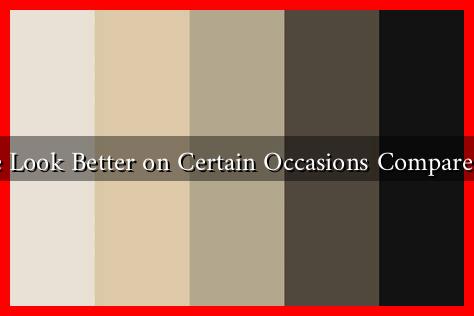-
Table of Contents
Does Beige Look Better on Certain Occasions Compared to Black?
When it comes to fashion, color choice can significantly influence the overall impression one makes. Two colors that often come into play are beige and black. While black is often associated with elegance and sophistication, beige offers a softer, more approachable aesthetic. This article explores the contexts in which beige may be more suitable than black and vice versa, providing insights into the psychology of color, cultural perceptions, and practical applications.
The Psychology of Color
Color psychology plays a crucial role in how we perceive and react to different colors. Black is often linked to authority, power, and formality, making it a popular choice for business attire and evening wear. Conversely, beige is associated with warmth, calmness, and neutrality. Understanding these associations can help individuals choose the right color for the right occasion.
- Black: Often seen as a color of sophistication, black is a staple in formal settings. It conveys confidence and professionalism.
- Beige: This color is perceived as friendly and approachable, making it ideal for casual or semi-formal occasions.
Occasions Where Beige Shines
Beige can be a fantastic choice for various occasions, particularly those that require a softer touch. Here are some scenarios where beige may outshine black:
- Outdoor Events: Beige blends well with natural surroundings, making it a great choice for garden parties, picnics, or beach weddings.
- Daytime Functions: For brunches or daytime gatherings, beige outfits can create a relaxed yet stylish look.
- Casual Settings: Beige is often more versatile in casual settings, allowing for a more laid-back vibe without sacrificing style.
When Black Takes the Lead
While beige has its advantages, there are occasions where black is the clear winner. Here are some examples:
- Formal Events: Black is the go-to color for black-tie events, galas, and formal dinners, where it exudes elegance and sophistication.
- Professional Settings: In corporate environments, black suits or dresses are often preferred for their authoritative appearance.
- Evening Wear: Black is a classic choice for evening outings, providing a sleek and timeless look.
Cultural Considerations
Color meanings can vary significantly across cultures. In Western cultures, black is often associated with mourning, while beige is seen as neutral and comforting. In contrast, in some Eastern cultures, black can symbolize wealth and power. Understanding these cultural nuances is essential when choosing an outfit for international events or diverse gatherings.
Case Studies: Beige vs. Black in Fashion
Several fashion designers and brands have showcased the versatility of both colors in their collections. For instance, renowned designer Ralph Lauren often incorporates beige into his spring and summer lines, emphasizing its suitability for warm-weather events. On the other hand, brands like Chanel have made black synonymous with luxury and timelessness, particularly in their iconic little black dress.
Statistics also support the popularity of these colors. According to a survey by the fashion website Vogue, 60% of respondents preferred black for formal occasions, while 45% favored beige for casual outings. This data highlights the distinct roles these colors play in our wardrobes.
Conclusion
In conclusion, the choice between beige and black largely depends on the occasion, cultural context, and personal style. Beige shines in casual and outdoor settings, offering a warm and approachable vibe, while black remains the go-to for formal and professional environments, exuding sophistication and authority. Understanding the psychological and cultural implications of these colors can help individuals make informed fashion choices that align with their desired image. Ultimately, both colors have their unique strengths, and the best choice will always depend on the specific circumstances at hand.

